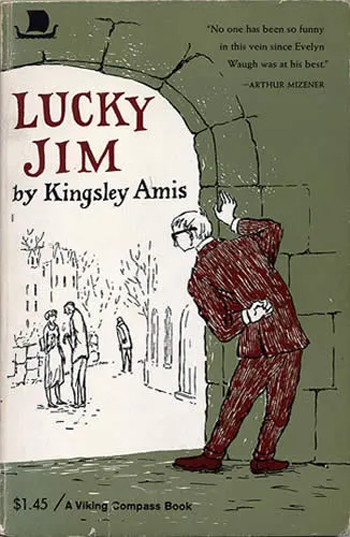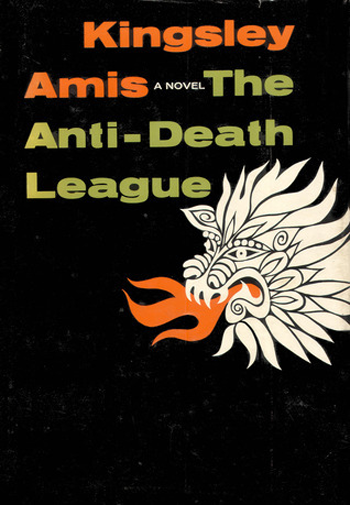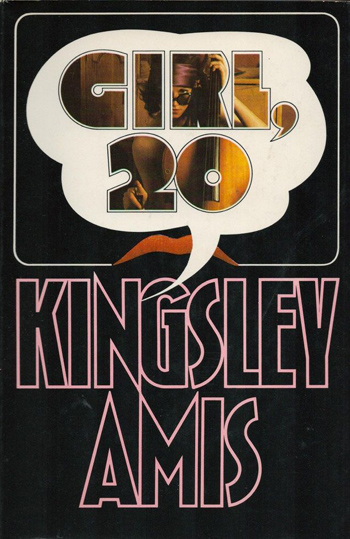by Pedro Blas González (November 2023)

Kingsley Amis, Ralph Steadman, 2007
For the first time he really felt that it was no use trying to save those who fundamentally would rather not be saved. To go on trying would not merely be to yield to pity and sentimentality, but wrong and, to pursue it to its conclusion, inhumane. —Kingsley Amis, Lucky Jim
 If Aristotle is correct that justice “consists in loving and hating aright,” perhaps no other writer will agree more than Kingsley Amis.
If Aristotle is correct that justice “consists in loving and hating aright,” perhaps no other writer will agree more than Kingsley Amis.
With literary style and wordsmith panache, Kingsley Amis (1922-1995), the British novelist and writer, slashes through the catalog of postmodern fakes, wannabes, hangers-on, and every variant of affected ‘progressive’ under the stars.
Amis writes about people. He tells us so in many interviews. How people relate to each other, their worldview, their likes, manners, pettiness, and how this corresponds to or merely debases human reality. Amis reserves special banter for ideologues and their attendant values. Yet, as a literary critic, he is very accommodating, often complimenting the writers and books he writes about. He has written that he does not review books he does not like.
A literary critic, novelist, and man of letters—yes, he is one of the last of those dinosaurs—Amis is a lover of commons sense and good taste. Both of those qualities qualify him as a low-brow critic, according to his well-placed and connected ideologue critics.
Ah, yes, and there is also Amis, the satirist. He is whimsical, witty, down to earth, and downright funny in his observations of what passes for life and values in postmodernity.
In a time when people do not read, and if they do, most can’t understand satire, Amis’ pen is sharper than is permitted today by censorial tyrants. He has little patience for progressive academic pretenders, who use literary convention as fodder for social-political ideology.
Amis was a prolific writer, publishing over twenty-five novels, twelve non-fiction books and three short story collections. His first novel was Lucky Jim (1954), a satire. Lucky Jim sheds light on the pompous and self-centered life of people in a university in England. The protagonist, Jim Dixon, is a lecturer who makes a mockery of the hollow and affected individuals that he encounters at the university. Lucky Jim won the 1955 Somerset Maugham Award for fiction.
 Amis is best known as a novelist. Yet literary variety and curiosity are key components of his writing. While realism is the main vehicle of his plots, he incorporates aspects of science fiction in several of his works. An avid reader of science fiction, when that genre was in its infancy, gaining in popularity from 1930 to the early 1960s. Amis published a truly readable and enlightening book about science fiction, New Maps of Hell: A Survey of Science Fiction (1960). Together with the Sovietologist, Robert Conquest, he edited five science fiction books, Spectrum: A Science fiction Anthology, I-V.
Amis is best known as a novelist. Yet literary variety and curiosity are key components of his writing. While realism is the main vehicle of his plots, he incorporates aspects of science fiction in several of his works. An avid reader of science fiction, when that genre was in its infancy, gaining in popularity from 1930 to the early 1960s. Amis published a truly readable and enlightening book about science fiction, New Maps of Hell: A Survey of Science Fiction (1960). Together with the Sovietologist, Robert Conquest, he edited five science fiction books, Spectrum: A Science fiction Anthology, I-V.
In 1965 Amis published The James Bond Dossier, one of his many captivating and poignant collection of essays. Also in 1965, he published a satire, The Book of Bond or, Every Man His Own 007, under the pseudonym Lt.Col. William Tanner. The book is a tongue-and check example of writing that pays homage to the lighter aspects of literature, if not life and death.
After the death of his friend, Ian Fleming, Amis was approached by the publisher of the Bond novels to write a James Bond novel. Under the pseudonym Robert Markham, Amis published Colonel Sun in 1968, what is a a loyal rendition of Fleming’s James Bond.
Attention to detail and diligent research are staples of Amis’ work that have earned him great respect as a writer. His non-fiction essays are meticulous displays of careful and thoughtful reading. His research infuses rich details into his novels, creating spirited pacing that moves his novels along with a masterstroke.
There are many Kingsley Amis books that showcase his talent for satire: The Old Devils, The Green Man, One Fat Englishman, Ending Up, The Anti-Death League, The Egyptologists, etc. Let’s take a brief look at Girl, 20.
Girl, 20
 Amis’ novel Girl, 20 (1971) takes readers to the chic values of the late 1960s and early ’70s. Girl, 20 is the fictional equivalent of Tom Wolfe’s 1970 non-fiction Radical Chic & Mau-Mauing the Flak Catchers; a portrayal of chic, radicalized, drink-and-be-merry, live-for-today, I’m OK – You’re OK values.
Amis’ novel Girl, 20 (1971) takes readers to the chic values of the late 1960s and early ’70s. Girl, 20 is the fictional equivalent of Tom Wolfe’s 1970 non-fiction Radical Chic & Mau-Mauing the Flak Catchers; a portrayal of chic, radicalized, drink-and-be-merry, live-for-today, I’m OK – You’re OK values.
Sir Roy Vandervane is an ageing conductor and composer of postmodern, avant-garde pieces. A performance of his cacophonous composition—Elevations 9—gets Sir Roy punched out.
Sir Roy’s family life is the triumph of dysfunctional-chic, an ominous sign of things to come in Western culture. While married with children, Sir Roy is a serial adulterer who prefers his girlfriends to be between 17 and 20 years of age, thus the title of the novel. This, he asserts, keeps him young and enables Sir Roy to keep up with the chic values of the times.
While Sir Roy’s professional life is characterized by his bloated and over-hyped fame, his family life is a complete failure, which his values have created, and which none of the family members seem to mind. Amis guides the reader through a tour of the tragedy that is postmodernity.
In classic Kingsley Amis fashion, Sir Roy’s younger friend, Douglas Yandell, also a friend of the family, plays along with Sir Roy’s escapades. Yandell realizes that Sir Roy’s leftist worldview is beyond help, and regrettably for his family—beyond redemption. This is the serious and hard-hitting Amis.
Amis’ suave and seamless narration creates a vivid picture of the inner life of his nihilistic characters, their failed worldview, and the infelicity this causes them, for his novels operate on a ‘show them, don’t tell them’ mode. Readers can make up their mind as to the redemptive or lack thereof quality of the main characters. Consider the state of mind, if not of being, of one of the characters in Girl, 20: “A fusion of boredom and discomfort into some third thing, a solipsistic despair, a progressive and apparently irreversible loss of belief in anything not here and not now, in tea, homework, television, school, cricket, holidays – this place is hell, in fact.”
Sir Roy’s 20-year-old girlfriend is the queen of abrasive dysfunctionality, and she is damn proud of it. The girl forces the reader to decide if she will be best served by a psychiatrist or an exorcist. She is not even a ‘work in progress’ —instead, a burnt-out case, at age 20.
Amis’ writing is never chic-sentimental. Never falling for the timely cliches of the early ‘70s, and beyond. Instead, he takes a stoic look at the casualties of postmodernism; always pointing to the future-trajectory and tragedies that dead-end values bring about. The entire Sir Roy clan, including the girlfriend, are doomed for failure. Narcissism and leftist chauvinistic politics bloat Sir Roy’s, his girlfriend, Sylvia, and his daughter’s sense of self-importance.
Sir Roy’s heroin-addicted teenage daughter is adamant about only living for the present. She tells Douglas how liberated she is: “That’s one of the things that’s so nice about it. Nothing’s going to last. None of that awful business of getting married and having children and being responsible. Nobody expecting anything of you.”
Table of Contents
Pedro Blas González is Professor of Philosophy in Florida. He earned his doctoral degree in Philosophy at DePaul University in 1995. Dr. González has published extensively on leading Spanish philosophers, such as Ortega y Gasset and Unamuno. His books have included Unamuno: A Lyrical Essay, Ortega’s ‘Revolt of the Masses’ and the Triumph of the New Man, Fragments: Essays in Subjectivity, Individuality and Autonomy and Human Existence as Radical Reality: Ortega’s Philosophy of Subjectivity. He also published a translation and introduction of José Ortega y Gasset’s last work to appear in English, “Medio siglo de Filosofia” (1951) in Philosophy Today Vol. 42 Issue 2 (Summer 1998). His most recent book is Philosophical Perspective on Cinema.
Follow NER on Twitter @NERIconoclast
- Like
- Digg
- Del
- Tumblr
- VKontakte
- Buffer
- Love This
- Odnoklassniki
- Meneame
- Blogger
- Amazon
- Yahoo Mail
- Gmail
- AOL
- Newsvine
- HackerNews
- Evernote
- MySpace
- Mail.ru
- Viadeo
- Line
- Comments
- Yummly
- SMS
- Viber
- Telegram
- Subscribe
- Skype
- Facebook Messenger
- Kakao
- LiveJournal
- Yammer
- Edgar
- Fintel
- Mix
- Instapaper
- Copy Link










One Response
Amis is grossly overrated. Brigid Brophy got him right.
Just a couple of points about Lucky Jim. Look at the antagonist’s verbal signature. Somebody with a Manchester accent might say something similar to ‘obviouslam’ but never, ever, ‘you sam’. That conservative medievalist – conservative medievalists exist but he would have rarity value because the left has had a half-nelson on medieval studies since the time of William Morris (though it would be interesting to find a professsor whose response to ‘Merrie England’ was anything but cackling deconstruction. Finally, Jim poses as anti-establishment but ends up as librarian to an aristocrat. Some rebellion!